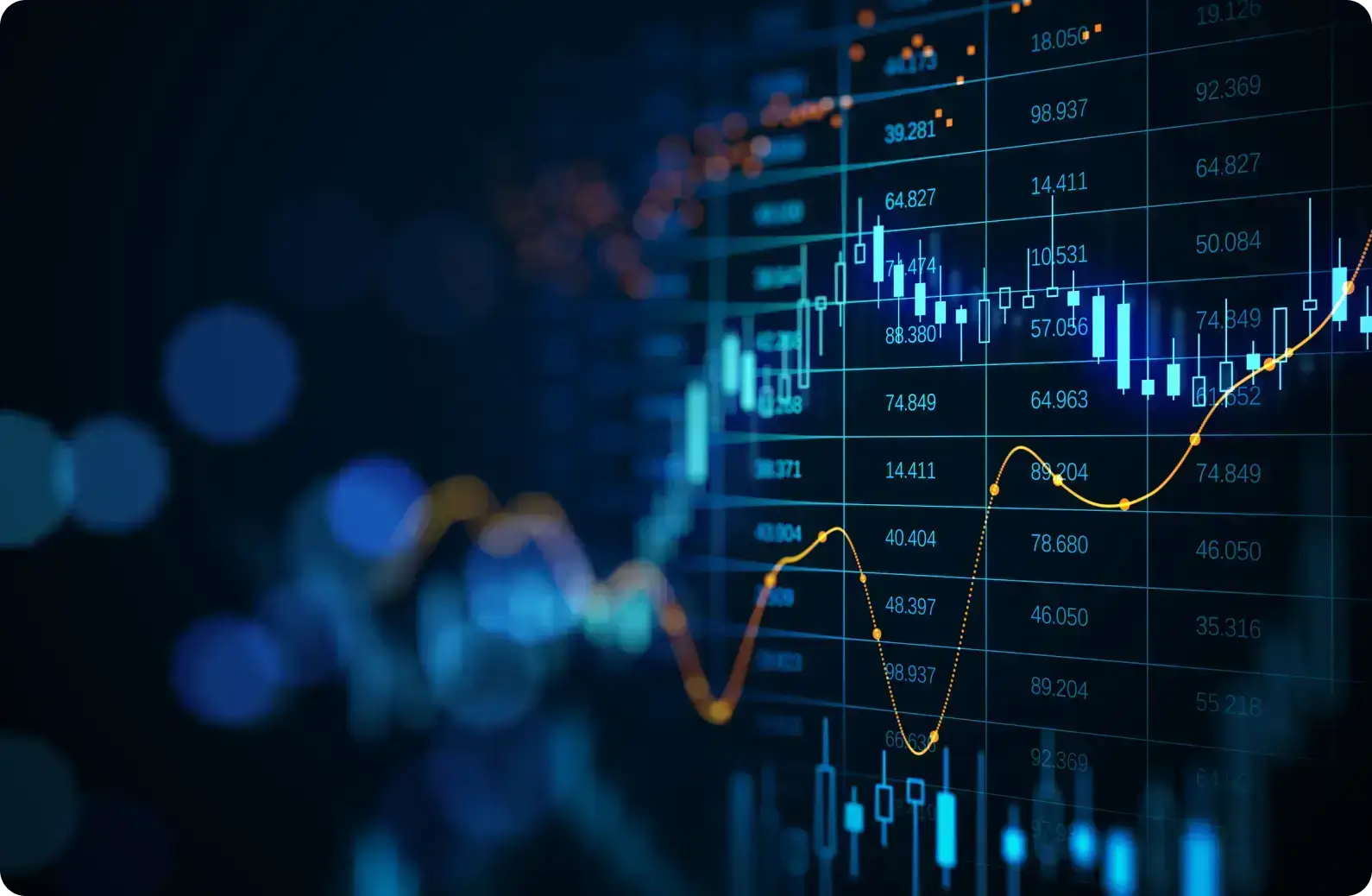What is
data science?

Data science is the key to transforming raw data into meaningful insights that drive decision-making and strategic planning. By applying advanced analytical techniques, data science enables businesses to predict trends, uncover patterns, and make data-driven decisions.
Why choose Devico for
data science services






High retention rate
96%
We go beyond the 80% industry norm with reliable, expert support.
Wide expert network
3000
Access to over 3000 engineers and AI experts.
Proven track record
500,000
Over 500,000 man-days successfully delivered.
Support
24/7
Highly experienced management team available around the clock.
Your data can do more
43% of data scientists consider automation as the most important skill to develop for the future
How does it work?
01
Start with the right data
Relevant. Real. Captured from every critical source.

02
Clean without compromise
Errors removed. Duplicates gone. Integrity restored.

03
Explore for insight
Hidden patterns revealed. Signals separated from noise.

04
Transform for clarity
Raw inputs reshaped into powerful, structured features.

05
Build models that think
Algorithms designed to learn, adapt, and predict.

06
Evaluate what matters
Performance measured by precision, accuracy, and impact.

07
Deploy into reality
Seamless integration into systems, processes, and decisions.

08
Monitor, improve, repeat
Constant feedback. Continuous learning. Always relevant.

How businesses use
Data Science
Healthcare
Data science enables healthcare providers to improve patient outcomes through predictive analytics and personalized treatment plans. It also aids in drug discovery and the management of healthcare resources.
Use cases:
- Predictive analytics for patient deterioration.
- Personalised treatment plans based on genetic data.
- Optimising resource allocation in hospitals.
- Accelerating drug discovery processes.


Data science enables healthcare providers to improve patient outcomes through predictive analytics and personalized treatment plans. It also aids in drug discovery and the management of healthcare resources.
Use cases:
- Predictive analytics for patient deterioration.
- Personalised treatment plans based on genetic data.
- Optimising resource allocation in hospitals.
- Accelerating drug discovery processes.

Financial institutions leverage data science for fraud detection, risk management, and to enhance customer service through personalised financial products.
Use cases:
- Real-time fraud detection.
- Risk assessment for credit and loans.
- Personalised financial product recommendations.
- Enhancing customer service through chatbots.

Retailers use data science to understand customer preferences, manage inventory, and optimise pricing strategies. This technology also helps in creating personalised marketing campaigns.
Use cases:
- Customer preference analysis for personalised experiences.
- Inventory management and demand forecasting.
- Dynamic pricing strategies.
- Targeted marketing campaigns.

In manufacturing, data science improves operational efficiency through predictive maintenance, quality control, and supply chain optimization.
Use cases:
- Predictive maintenance for machinery.
- Quality control through defect detection.
- Optimising production processes.
- Enhancing supply chain management.
Future-proof your data
It is estimated that 97.2 zettabytes (ZB) of data will be generated globally
AI chatbots services
we provide
- check_circle
What it means: Data collection involves gathering raw data from various sources such as databases, APIs, sensors, and user interactions.
- check_circle
Goal: To acquire relevant and high-quality data that serves as the foundation for subsequent data processing and analysis.
- check_circle
Practical application: In healthcare, data collection from electronic health records, wearable devices, and medical tests helps create comprehensive patient profiles, leading to better diagnosis and personalized treatment plans.
- check_circle
Data & statistics: By 2025, the global data sphere is projected to grow to 175 zettabytes, highlighting the critical need for effective data collection methods.
- check_circle
What it means: Data storage refers to the methods and technologies used to save and manage data securely and efficiently.
- check_circle
Goal: To ensure that collected data is stored in a way that is accessible, reliable, and scalable for future use.
- check_circle
Practical application: In finance, robust data storage solutions enable the secure retention of transaction records and customer information, ensuring compliance with regulatory requirements and enabling advanced analytics.
- check_circle
Data & statistics: According to IDC, global spending on cloud services is expected to reach $1.3 trillion by 2025, underscoring the shift towards scalable data storage solutions.
- check_circle
What it means: Data extraction involves retrieving relevant information from various sources for analysis.
- check_circle
Goal: To transform raw data into a structured format that can be easily analyzed and utilized.
- check_circle
Practical application: In retail, data extraction from customer feedback and sales transactions helps in understanding customer preferences and improving product offerings.
- check_circle
Data & statistics: Forbes reports that 95% of businesses consider managing unstructured data a major challenge, emphasizing the importance of effective data extraction.
- check_circle
What it means: Data cleaning involves correcting or removing inaccuracies, inconsistencies, and errors from the dataset to improve its quality.
- check_circle
Goal: To ensure the integrity and accuracy of the data, making it suitable for analysis.
- check_circle
Practical application: In marketing, refining customer data ensures that marketing campaigns are targeted accurately, reducing waste and increasing effectiveness.
- check_circle
Data & statistics: Gartner estimates that poor data quality costs organizations an average of $12.9 million annually, highlighting the importance of data cleaning.
- check_circle
What it means: Data analysis involves inspecting, cleansing, transforming, and modeling data to discover useful information, draw conclusions, and support decision-making.
- check_circle
Goal: To extract meaningful insights from data that inform strategic business decisions.
- check_circle
Practical application: In manufacturing, analyzing production data can identify inefficiencies in the process and suggest improvements to increase productivity and reduce costs.
- check_circle
Data & statistics: According to a report by McKinsey, data-driven organizations are 23 times more likely to acquire customers, six times as likely to retain them, and19 times more likely to be profitable.
- check_circle
What it means: Data visualization is the graphical representation of data to help stakeholders understand complex data insights through visual elements like charts, graphs, and maps.
- check_circle
Goal: To present data in a visually appealing and easily interpretable format that aids in understanding and decision-making.
- check_circle
Practical application: In education, visualizing student performance data helps educators identify areas for improvement and tailor their teaching strategies accordingly.
- check_circle
Data & statistics: The global data visualization market is expected to reach $10.2 billion by 2027, reflecting the growing importance of visual tools in data analysis.
Basic techniques of data science
Probability and statistics
Provides the foundation for analyzing data and making predictions.
Distribution analysis
Examines how data points are dispersed across a range of values. Helps identify patterns and anomalies.
Regression analysis
Predicts future outcomes by modeling the relationship between dependent and independent variables.
Descriptive statistics
Utilizes measures like mean, median, and standard deviation to summarize key data characteristics.
Inferential statistics
Draws conclusions and makes predictions about a population based on analysis of a sample.
Non-parametric statistics
Analyzes data without assuming any specific data distribution. Useful for handling data that do not fit normal distribution patterns.
Hypothesis testing
Evaluates the validity of assumptions or claims about a dataset using sample data analysis.
Linear regression models
Models the relationship between variables using a straight line to predict the value of a dependent variable based on one or more independent variables.
Logistic regression
Used for classification tasks to predict binary outcomes. Models the probability of a binary response based on one or more predictor variables.
Neural networks
Mimic the human brain to recognize complex patterns in data. Make decisions for tasks like image and speech recognition.
K-means clustering
Partition data points into k distinct clusters based on similarity. Useful for exploratory data analysis and identifying natural groupings in data.
Decision trees
Use a tree-like structure to make decisions based on data. Splits data into branches to visualize decisions and predict outcomes.
Professional AI guidance
Studies indicate a high failure rate of 70% among data science projects
Data science technologies
Artificial Intelligence
AI leverages data science to create intelligent systems that can learn and adapt.
Use cases:
01
Automated customer service with chatbots
02
Predictive analytics for business forecasting.
03
Personalised marketing strategies.
04
Enhancing product recommendations.
Cloud Computing
Cloud platforms provide the infrastructure needed to store and process large datasets.
Use cases:
01
Scalable data storage solutions.
02
High-performance computing for data analysis.
03
Collaborative data science projects.
04
Real-time data processing and analytics.
Internet of Things (IoT)
IoT devices generate vast amounts of data that can be analysed to gain insights.
Use cases:
01
Predictive maintenance for industrial equipment.
02
Smart home automation and energy management.
03
Real-time health monitoring with wearable devices.
04
Optimising supply chain logistics.
Quantum Computing
Quantum computing offers the potential to solve complex data problems much faster than classical computers.
Use cases:
01
Optimising complex supply chain logistics.
02
Accelerating drug discovery processes.
03
Enhancing cybersecurity measures.
04
Solving complex financial models and simulations.
Get in touch
Drop us a line about your project and we will contact you within a business day
Our locations
New York
521 Fifth Ave, NY 10175
+1 805 491 9331London
9 Brighton Terrace, SW9 8DJ
+44 1922 214429Warsaw
Towarowa 28, 00-847
info@devico.ioLviv
Uhorska str. 14, 79034
info@devico.ioQuestions & answers
What kind of problems can data science services actually solve for us?
From predicting customer churn to optimizing operations, data science services turn raw data into better decisions – faster, smarter, and at scale.
How do I know if we really need a data science company?
If you’re sitting on data but not getting value from it – or making decisions based on gut, not facts – then yes, a data science company can help.
Are data science services only for large enterprises?
No. Startups and mid-sized companies often benefit the most – they move fast and need insights to scale with confidence.




